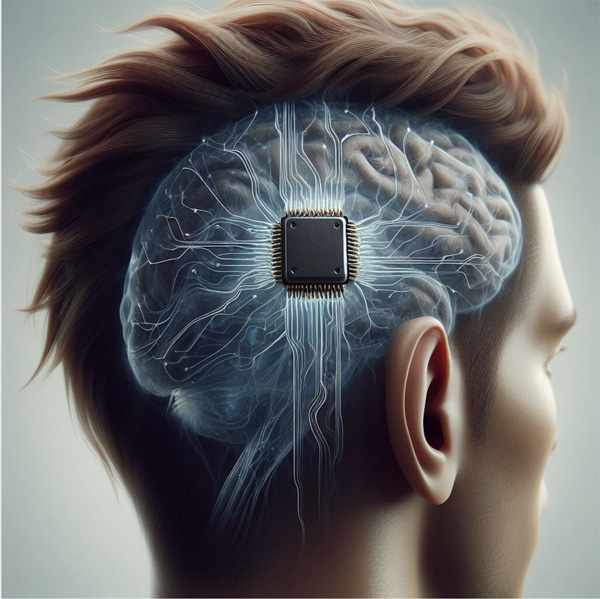Neuralink provides implant to second person with spinal cord injury

[An artistic rendering of a chip implanted into the brain. Photo credit: Pixabay]
Elon Musk, the founder of Tesla and SpaceX, has announced that a second person with a spinal cord injury has been implanted with a Neuralink brain-computer interface device.
As Neuralink’s founder, Musk discussed the second successful implantation of the Neuralink device during a podcast interview hosted by computer scientist Lex Fridman.
The second Neuralink implant was successful and is functioning correctly with around 400 electrodes successfully transmitting neural signals.
Musk predicted that in the coming years the company will significantly increase the number of electrodes in the implant and improve the signal processing capabilities.
The electrodes capture brain signals that are then routed to the implant's electronics, which process and wirelessly transmit the neural data to Neuralink software running on an external device like a computer.
The underlying principle behind brain-computer interfaces like Neuralink is straightforward.
The brain's neural activity generates electrical signals, and a machine can measure and interpret those signals.
Just as an FM radio can tune in and decode specific frequencies as distinct radio broadcasts, a computer can interpret different electrical signals from the brain as distinct commands or inputs.
The Neuralink brain-computer interface is a fully implantable device that is designed to be cosmetically invisible and allows users to wirelessly control a computer or mobile device from anywhere, without the need for any external components.
The second Neuralink brain implant procedure was initially delayed in June after the patient who was scheduled to undergo the surgery had to withdraw due to an unspecified medical issue.
Quadriplegic Noland Arbaugh, was the first human to receive a Neuralink brain implant.
He underwent the procedure earlier this year as part of a Neuralink clinical trial.
Arbaugh has stated that the device significantly improved his quality of life.
He is now able to easily perform tasks like playing video games, chess, and browsing the internet –activities that were difficult for him before the surgery.
Prior to the Neuralink procedure, Arbaugh had been adjusting to life after a 2016 diving accident left him with a spinal cord injury.
Noland Arbaugh did face some challenges during his experience with the Neuralink implant.
For instance, he began to lose control of the mouse’s cursor, which he initially thought was due to changes made by the Neuralink team.
However, they later informed him that the device's threads were becoming dislodged from his brain.
At the time, the Neuralink team was unsure about the severity of the issue and had limited knowledge about it.
Elon Musk claims that Neuralink will eventually give people superpowers by enhancing human capabilities.
In the near future, Musk has boasted that Neuralink will enable humans to gain abilities like thermal vision, enhanced visual acuity, and even the ability to restore sight to the blind.
He also believes the technology could be used to treat various diseases and heal certain neurological disorders.
Musk stated that once people experience communication through the Neuralink implant, they will find traditional methods of human and computer interaction, such as typing or speaking, to be slow in comparison to the speed enabled by the brain-computer interface.

- Chloe Kim / Grade 11
- Seoul International School

![THE HERALD STUDENT REPORTERS [US]](/assets/images/logo_student_us.png)
![THE HERALD STUDENT REPORTERS [Canada]](/assets/images/logo_student_ca.png)
